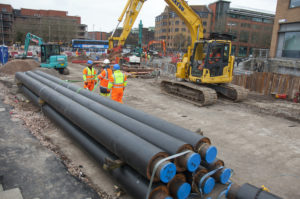 Bristol has agreed plans to ‘decarbonise, decentralise and democratise’ the city’s energy system. Now it is trying to find a partner to fund its ambition.
Bristol has agreed plans to ‘decarbonise, decentralise and democratise’ the city’s energy system. Now it is trying to find a partner to fund its ambition.
In recent years, Bristol City Council has invested around £50m in energy projects, ranging from wind and solar to district heating. Now it’s planning to step that up by two orders of magnitude and decarbonise the entire city.
Bristol’s City Leap programme aims to find financial, technology and services partners to deliver its bold ambition. Following the launch of its prospectus last year, 180 organisations from around the world have expressed interest in working with Bristol – and the council has met each and every one of them.

that can look at a
strategic level across
the whole system
“That was 180 important meetings that weren’t previously in the diary,” says James Sterling, who manages engagement and partnerships for the City Leap project. “But it was a fascinating exercise. What we got back was astounding – and we came away with a menu of emerging options to formulate a master plan.”
From those options emerged a preferred approach: A joint venture with an institutional partner, or consortium, to fund everything from a massive heat network expansion, through renewable energy (including marine energy) and battery storage, to a city-wide energy efficiency programme.
Political will
Cabinet gave the plan the green light on 2 April, says Sterling, “and we now have approval from the Mayor to go forward and undertake a procurement exercise to find that partner.”
As cabinet meetings go, “it was one of the most exciting I have ever been in,” says Sterling. “Our politicians are really engaged in doing this, delivering something transformational to meet our decarbonisation targets.”
While Bristol has undertaken more energy projects than most over the last decade, much of it has been “in a piecemeal fashion based on specific technology to solve particular challenges”, Sterling admits.
“City Leap is about bringing all of that together and transforming the system for Bristol – creating a decarbonised, decentralised and democratic system,” he adds. “So we need a partner that can look at a strategic level across the whole system.”
Unlocking investment

While the City Leap prospectus looks out to 2027, outlining an £875m investment plan, Councillor Kye Dudd, cabinet member for Energy and Transport, says the council estimates it will cost around £5bn to fully decarbonise the city’s energy and transport system.
“All the enabling technology is there,” says Dudd, “the only piece that is missing is the investment.”
If government is serious about hitting net zero by 2050, says Dudd, it needs to immediately “step up” with funding. “But we in Bristol are not waiting around for that – it is a climate emergency. Hence developing policy like City Leap; a partnership between the council and strategic investors to help us drive change.”
That strategic partner – potentially an institutional investor – must share Bristol’s values and ethos, says Dudd.
“They have to be in it for the long-term and share the journey,” he says. “We accept they need to make a return; there must be some margin in it for them, but we will need a partner that is willing to commit long-term to Bristol.”
Underneath the investment framework, delivery work is open to all parties, says Dudd. “SMEs, local businesses, communities: We want the widest possible involvement.”
Spend to save
Investing £5bn means one way or another, ratepayers will have to pay it back. But Dudd believes residents will benefit financially. He cites the council’s district heating schemes in Hartcliffe and Redcliffe, commissioned in 2015/16, which predominantly heat social housing.
“The city centre and Redcliffe are my wards,” says Dudd. “I had residents coming into surgeries to complain because their bills had been cut in half – they said they must have been overcharged previously. They could not believe a physical intervention could reduce bills by that much.”
Similarly, says Dudd, by decarbonising the city, “we can reduce bills and protect people from market volatility,” while the council will also make a margin to recycle into other initiatives. James Sterling adds that investing in energy efficiency and generation across the council’s estate will also create revenue and savings that can be passed on to ratepayers.
Business engagement
While the council has control over its own estate and services, it needs businesses to get onboard. Although engaging with firms to decarbonise is high on the agenda, the council can also pull some levers. For example, planning conditions require any new city centre development within the planned heat network expansion to connect to it. As such, the council has just signed its first commercial customer, a private development of 350 homes, “which we hope will be the first of many,” says Sterling.
Heat networks

Heat is regarded as the most difficult aspect of decarbonising the economy. If Bristol can secure a suitable financial partner for the City Leap project, the plan is to extend the heat network all the way out to five energy from waste facilities, clustered eight miles north west of the city, at Avonmouth. “That’s a long dig,” admits Sterling. “But our calculations indicate the waste heat from those plants would deliver 40-45 per cent of the city’s heat load.”
At present, the city’s heat networks are largely biomass and gas powered, but Sterling says the long-term plan is to phase out natural gas. He points to the Geneco biogas operation with Wessex Water and says sewage could also fuel heat networks in future, while local solutions like ground and water source heat pumps will “undoubtedly play a key role”.
What next?
Since gaining cabinet approval, Bristol has been working on “a robust procurement process that ensures a good quantity of quality bids from organisations that could play that strategic partner role” for Bristol, says Sterling.
“We only get one shot, so it’s important that process is right to ensure we form the best partnership that delivers all of our objectives; environmental, social and economic,” he says. As such, he is reluctant to commit to a tender launch date, “but it will likely be in fourth quarter 2019.”
Other councils serious about decarbonising – and central government – will no doubt be watching closely.
City-wide smart network
The City Leap prospectus outlines a broad range of projects to take forward, with approximate investment values out to 2027 for district heating (£300m) domestic and commercial energy efficiency (£400m+) and renewable energy (£40m).
It also outlines a £125m plan for a city-wide smart energy system, combining demand-side response, storage, electric vehicles and vehicle-to-grid, networked heat pumps and smart appliances.
Incentivising behaviour change
Alongside infrastructure, Bristol is also trialling initiatives to incentivise energy efficient behaviour. The council recently signed-up to pilot Energi Mine’s blockchain-based rewards system, whereby staff earn redeemable points for making energy efficient choices. Councillor Kye Dudd says the concept is win-win: the council saves money on its energy bill, and “hopefully some of those positive behaviours will overlap into people’s home lives and in time influence friends and relatives”.
In the long run, he says, “behaviour change at a city-level will be key” to hitting Bristol’s carbon goals.
This article appears in The Energyst’s June/July print issue. If you have some responsibility for energy procurement, management or sustainability for your organisation, you qualify for a free subscription.
Related stories:
Bristol pilots blockchain energy efficiency rewards scheme
Bristol, Devon and Plymouth councils land Euromillions for energy projects
Bristol commits £5m to heat networks, eyes bigger prize
Click here to see if you qualify for a free subscription to the print magazine, or to renew.
Follow us at @EnergystMedia. For regular bulletins, sign up for the free newsletter.




No mention of £5 billion plan in the City Leap Prospectus…
Prospectus goes out to 2027 – Cllr Kye Dudd says £5bn an estimate out to 2050.